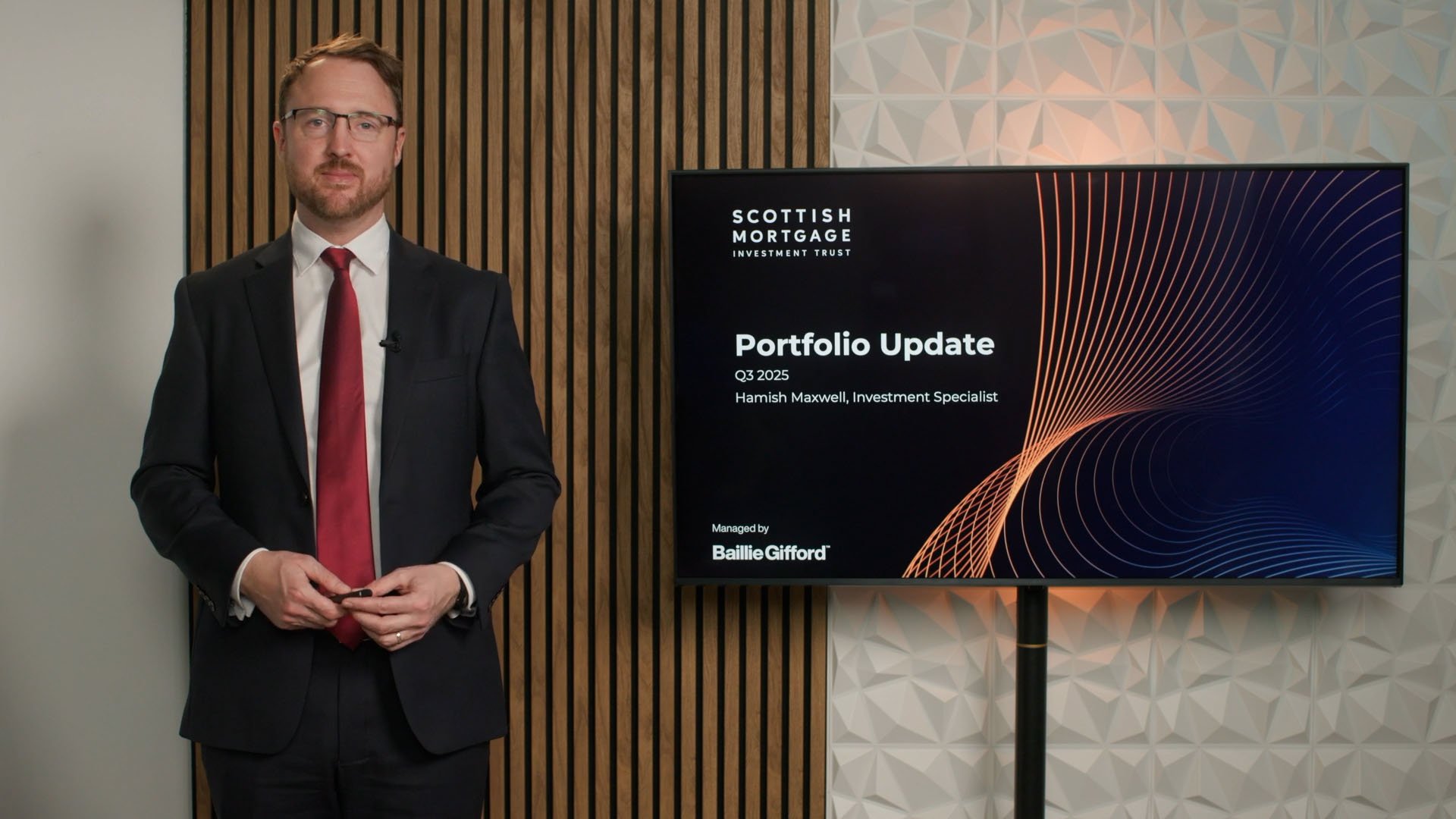Perspectives on Progress #1
Claire Shaw – Portfolio Director
From exciting company developments and portfolio activity to challenging regulatory requirements and industry headlines, Perspectives on Progress offers you the Scottish Mortgage Team’s view on the landscape we see around us...

All investment strategies have the potential for profit and loss. Your or your clients’ capital may be at risk.
Roblox
Immersive advertising in the metaverse – a new opportunity
When founder Dave Baszucki set up Roblox 18 years ago, his vision was “to create a virtual space where people play, work, learn and create together”. That vision has not changed. The company is now leading the charge ushering in a new category that it dubs “3D human co-experience”, otherwise known as ‘the metaverse’ – the term du jour.
Boasting a rapidly-expanding active user base of about 58 million users, Roblox thinks now is the right time to test out ‘immersive advertising’ on the platform. This a visionary type of advertising, one that does not get in the way or interrupt the user, similar to the way we see billboard ads in the ‘real world’.
Roblox already has partnerships with over 90 of the world’s most well-known brands, everything from Gucci and Burberry to the NFL, Warner Bros and NASCAR. Because there are many younger players on the platform, ones that will become the next generation of consumers, it makes sense that brands are trying to connect offline products to online worlds.
Brand marketing in the metaverse is in its infancy. But with the more established players in the online ad market experiencing some turbulence – in part due to the emergence of a ferocious new competitor in TikTok – we may see more brands deploying immersive advertising on platforms such as Roblox.
Advertising could also diversify Roblox’s revenue stream beyond virtual goods within games by giving the company another monetisation stream in what is the trillion-dollar online ad market.

Bolt Threads /Ginkgo Bioworks
Fungi fashion
Mushroom-inspired fashion? Maybe not as strange as you might think, given this year, fashion designer Stella McCartney released the first luxury bag made from ’mushroom leather’. That is Bolt Threads’s Mylo™ material — an animal-free, sustainable leather alternative, made from mycelium, the underground root-like system of fungi.
Bolt has recently enlisted the help of another Scottish Mortgage holding, Ginkgo Bioworks, to help optimise the production efficiency of Mylo™ material. Through this partnership, Ginkgo aims to increase the growth rate of Bolt's mycelium, thereby lowering the overall production costs of Mylo™.
Bolt Threads is being backed by pioneering brands, such as adidas, lululemon and Kering. This demonstrates a collective recognition by those in both the fashion and textiles industry to use more sustainable, more environmentally friendly alternatives to leather.
The more brands experiment with mycelium, the faster producers will be able to solve the challenges and make the material more accessible. Bolt is at the forefront of this shift in embracing new possibilities with lower environmental impact.


Joby Aviation
Pioneering partnership with Delta Airlines to provide city-to-airport service by air
Joby Aviation is one of the companies revolutionising the personal transportation industry with its electric, vertical take-off-and-landing (eVTOL) aircraft, ie a ‘flying taxi’.
The company has recently announced a partnership with Delta Airlines to provide home-to-airport transportation services, a first of its kind. Delta passengers travelling through two of America’s busiest cities, New York and Los Angeles, can skip the road traffic by taking a Joby eVTOL to and from the airport. And it is this potential for Joby to become the ‘Uber of the Air’ that excites us.
Founder JoeBen Bevirt aims to save “one billion people, one hour per day” by providing faster, quieter and sustainable modes of transport. If the company succeeds, it has a chance of becoming one of the most valuable and interesting companies emerging from the green transition.
Joby has had a rough ride since it went public last year. The stock market has very little patience currently for pre-revenue companies and technologies that may not commercialise in the very short term.
Undoubtedly, there will be setbacks as airport certification is notoriously slow and hard. The Delta partnership gives the company a much-needed vote of confidence at a time when others are sceptical about the long-term potential that this technology offers for the future of transport.
Netflix
In New Territory
Netflix has had a challenging year. The decline in subscriber numbers earlier this year triggered questions about increased competition from Disney and others, worries that the US market is saturated, and with content spending at an all-time high, doubts about future growth potential.
Netflix has sought to address this by introducing a cheaper, ad-driven, subscription service, ‘Basic with Ads’. It targets the price-sensitive customers who either do not currently use the service or that borrow someone else's password.
The response from advertisers has been “extremely positive”, to the extent that Netflix has had to turn some potential customers away because it doesn’t yet have the capacity to serve them. Demand is also helped, as Disney CEO Bob Iger has said, because traditional TV and satellite is heading for a precipice.
Netflix has a successful record in making big strategic changes, partly due to the culture and vision that Reed Hastings propels.
There are signs of encouragement, particularly with the speed Netflix has executed this initiative. But the introduction of an advertising tier is new territory for the company. It is an area we will monitor closely in case we need to recalibrate our probability-adjusted upside scenarios for long-term growth potential.


Horizon Robotics
In China, For China
Volkswagen’s (VW) mantra has always been “in China, for China”. This is perhaps why it has recently announced a joint venture with China-based Horizon Robotics which provides computing solutions for smart vehicles.
Together, the companies will develop technology that can integrate numerous functions for autonomous driving onto a single chip that will only be customised specifically for automated driving solutions in the Chinese market.
VW believes that by localising its business in China with good domestic partners, it will accelerate the pace of innovation and crucially strengthen its presence in one of the most important and dynamic automotive markets in the world.
Horizon, whose mission is “to make human life safer and better”, is a leading provider of energy-efficient computing solutions for advanced driver assistance systems (ADAS) and autonomous driving (AD) for smart vehicles.
Its goal is to help its customers own intelligent vehicles that make real-time decisions based on the information it gathers from internal systems and the external environment.
The company hopes that by closely collaborating with a community of partners, it can offer products and services in an open ecosystem that advances the next generation of smart vehicle driving experiences. By accelerating the development, commercialisation and mass production of software and hardware technologies in the automotive sector in China, Horizon is striving to make automated driving for Chinese customers a reality faster.
The trust invests in overseas securities. Changes in the rates of exchange may also cause the value of your investment (and any income it may pay) to go down or up.
The trust has a significant investment in private companies. The trust’s risk could be increased as these assets may be more difficult to sell, so changes in their prices may be greater.
The trust invests in emerging markets where difficulties in dealing, settlement and custody could arise, resulting in a negative impact on the value of your investment.
About the author - Claire Shaw
Portfolio Director
Claire Shaw is a portfolio director and plays a prominent role in servicing Scottish Mortgage’s UK shareholder base. Before joining in 2019, she spent over a decade as a fund manager with a focus on managing European equity portfolios for a global client base. With a background in analysing companies and communicating investment ideas, Claire is also responsible for creating engaging content that makes the Scottish Mortgage portfolio accessible to all its shareholders. Beyond that, she works closely with the managers, meeting with portfolio companies and conducting in-depth portfolio discussions with shareholders.
Regulatory Information
This content was produced and approved at the time stated and may not have been updated subsequently. It represents views held at the time of production and may not reflect current thinking. Read our Legal and regulatory information for further details.
A Key Information Document is available by visiting our Documents page. Any images used in this content are for illustrative purposes only.
This content does not constitute, and is not subject to the protections afforded to, independent research. Baillie Gifford and its staff may have dealt in the investments concerned. The views expressed are not statements of fact and should not be considered as advice or a recommendation to buy, sell or hold a particular investment.
Baillie Gifford & Co and Baillie Gifford & Co Limited are authorised and regulated by the Financial Conduct Authority (FCA). The investment trusts managed by Baillie Gifford & Co Limited are listed on the London Stock Exchange and are not authorised or regulated by the FCA.
Baillie Gifford Asia (Hong Kong) Limited 柏基亞洲(香港)有限公司 (BGA) holds a Type 1 licence from the Securities and Futures Commission of Hong Kong to market and distribute Baillie Gifford’s range of collective investment schemes and closed-ended funds such as investment trusts to professional investors in Hong Kong.
Baillie Gifford Asia (Singapore) Private Limited (BGAS) is regulated by the Monetary Authority of Singapore as a holder of a capital markets services licence to conduct fund management activities for institutional investors and accredited investors in Singapore. BGA and BGAS are wholly owned subsidiaries of Baillie Gifford Overseas Limited, which is wholly owned by Baillie Gifford & Co.
Europe
Scottish Mortgage Investment Trust PLC (the “Company”) is an alternative investment fund for the purpose of Directive 2011/61/EU (the “AIFM Directive”). Baillie Gifford & Co Limited is the alternative investment fund manager (“AIFM”) of the Company and has been authorised for marketing to Professional Investors in this jurisdiction.
This content is made available by Baillie Gifford Investment Management (Europe) Limited (“BGE”), which has been engaged by the AIFM to carry out promotional activities relating to the Company. BGE is authorised by the Central Bank of Ireland as an AIFM under the AIFM Regulations and as a UCITS management company under the UCITS Regulation. BGE also has regulatory permissions to perform promotional, advisory and Individual Portfolio Management activities. BGE has passported its authorisations under the mechanisms set out in the AIFM Directive.
Belgium
The Company has not been and will not be registered with the Belgian Financial Services and Markets Authority (Autoriteit voor Financiële Diensten en Markten / Autorité des services et marchés financiers) (the FSMA) as a public foreign alternative collective investment scheme under Article 259 of the Belgian Law of 19 April 2014 on alternative collective investment institutions and their managers (the Law of 19 April 2014). The shares in the Company will be marketed in Belgium to professional investors within the meaning the Law of 19 April 2014 only. Any offering material relating to the offering has not been, and will not be, approved by the FSMA pursuant to the Belgian laws and regulations applicable to the public offering of securities. Accordingly, this offering as well as any documents and materials relating to the offering may not be advertised, offered or distributed in any other way, directly or indirectly, to any other person located and/or resident in Belgium other than to professional investors within the meaning the Law of 19 April 2014 and in circumstances which do not constitute an offer to the public pursuant to the Law of 19 April 2014. The shares offered by the Company shall not, whether directly or indirectly, be marketed, offered, sold, transferred or delivered in Belgium to any individual or legal entity other than to professional investors within the meaning the Law of 19 April 2014 or than to investors having a minimum investment of at least EUR 250,000 per investor.
Germany
The Trust has not offered or placed and will not offer or place or sell, directly or indirectly, units/shares to retail investors or semi-professional investors in Germany, i.e. investors which do not qualify as professional investors as defined in sec. 1 (19) no. 32 German Investment Code (Kapitalanlagegesetzbuch – KAGB) and has not distributed and will not distribute or cause to be distributed to such retail or semi-professional investor in Germany, this document or any other offering material relating to the units/shares of the Trust and that such offers, placements, sales and distributions have been and will be made in Germany only to professional investors within the meaning of sec. 1 (19) no. 32 German Investment Code (Kapitalanlagegesetzbuch – KAGB).
Luxembourg
Units/shares/interests of the Trust may only be offered or sold in the Grand Duchy of Luxembourg (Luxembourg) to professional investors within the meaning of Luxembourg act by the act of 12 July 2013 on alternative investment fund managers (the AIFM Act). This document does not constitute an offer, an invitation or a solicitation for any investment or subscription for the units/shares/interests of the Trust by retail investors in Luxembourg. Any person who is in possession of this document is hereby notified that no action has or will be taken that would allow a direct or indirect offering or placement of the units/shares/interests of the Trust to retail investors in Luxembourg.
Switzerland
The Trust has not been approved by the Swiss Financial Market Supervisory Authority (“FINMA”) for offering to non-qualified investors pursuant to Art. 120 para. 1 of the Swiss Federal Act on Collective Investment Schemes of 23 June 2006, as amended (“CISA”). Accordingly, the interests in the Trust may only be offered or advertised, and this document may only be made available, in Switzerland to qualified investors within the meaning of CISA. Investors in the Trust do not benefit from the specific investor protection provided by CISA and the supervision by the FINMA in connection with the approval for offering.
Singapore
This content has not been registered as a prospectus with the Monetary Authority of Singapore. Accordingly, this content and any other content or material in connection with the offer or sale, or invitation for subscription or purchase, of the Trust may not be circulated or distributed, nor may be offered or sold, or be made the subject of an invitation for subscription or purchase, whether directly or indirectly, to persons in Singapore other than (i) to an institutional investor (as defined in Section 4A of the Securities and Futures Act 2001, as modified or amended from time to time (SFA)) pursuant to Section 274 of the SFA, (ii) to a relevant person (as defined in Section 275(2) of the SFA) pursuant to Section 275(1), or any person pursuant to Section 275(1A), and in accordance with the conditions specified in Section 275 of the SFA, or (iii) otherwise pursuant to, and in accordance with the conditions of, any other applicable provision of the SFA.
Where the Trust is subscribed or purchased under Section 275 by a relevant person which is:
(a) a corporation (which is not an accredited investor (as defined in Section 4A of the SFA)) the sole business of which is to hold investments and the entire share capital of which is owned by one or more individuals, each of whom is an accredited investor; or
(b) a trust (where the trustee is not an accredited investor) whose sole purpose is to hold investments and each beneficiary of the trust is an individual who is an accredited investor, securities or securities-based derivatives contracts (each term as defined in Section 2(1) of the SFA) of that corporation or the beneficiaries’ rights and interest (howsoever described) in that trust shall not be transferred within six months after that corporation or that trust has acquired the securities pursuant to an offer made under Section 275 except:
(1) to an institutional investor or to a relevant person or to any person arising from an offer referred to in Section 275(1A) or Section 276(4)(c)(ii) of the SFA,
(2) where no consideration is or will be given for the transfer;
(3) where the transfer is by operation of law; or
(4) pursuant to Section 276(7) of the SFA or Regulation 37A of the Securities and Futures (Offers of Investments) (Securities and Securities-based Derivatives Contracts) Regulations 2018.







